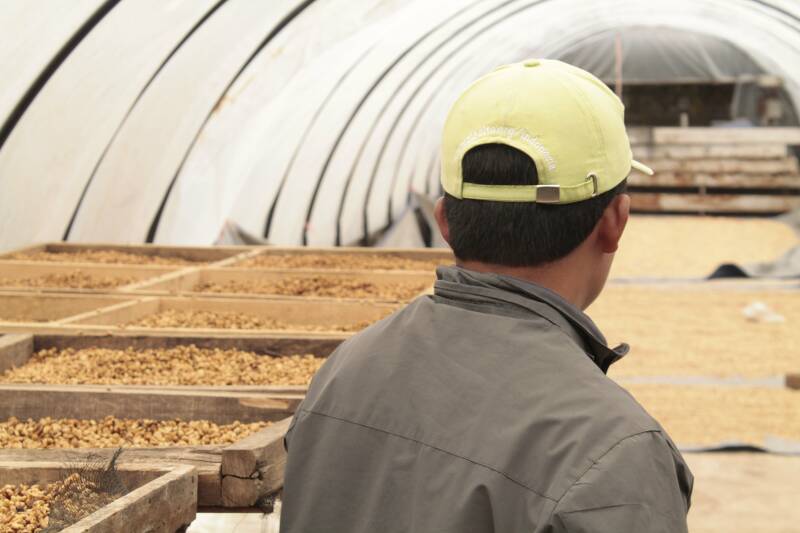
(Scroll down for Englisch)
Bijna alle boerderijen op Sumatra zijn klein.
Bedrijven zijn gemiddeld tussen de 0,5 en 2,5 hectare groot.
Koffie is meestal het belangrijkste marktgewas voor boeren, maar de meesten planten hun bomen ook naast groenten, aardappelen en fruit. Deze tussen gekweekte producten zullen een substantieel deel uitmaken van het dieet van het gezin voor het hele jaar.
Naast het verbouwen van koffie als een marktgewas, werken veel kleine boeren ook bij ingehuurde arbeiders op de nabijgelegen theeplantages. Thee is ook een enorm gewas in het gebied. De grotere theeplantages staan vaak in de buurt van koffieboerderijen. Als de oogst voorbij is, gaan de koffieboeren daar onder contractarbeid bladeren plukken.
Oogst
Tijdens het oogstseizoen wordt koffie met de hand geplukt, waarbij de arbeid meestal door de directe familie wordt geleverd. Na het plukken wordt de koffie bezorgd bij UPH.
Dit is een verzamelcentrum waar koffiebessen worden gekocht en waar de koffie wordt verwerkt voordat deze naar de centrale molen wordt verplaatst. In wezen functioneert een UPH als een klein was station
Indonesië staat bekend om zijn unieke ‘Wet Hulled’ Process (Giling Basah).
Bij deze honingpartij wordt de koffie verpulverd zonder water te gebruiken en vervolgens direct op verhoogde bedden gedroogd om te drogen. De bedden zijn in koepels geplaatst om de koffie te beschermen tegen regen of fel zonlicht. Het perkament zal hier ongeveer 20 dagen drogen, of totdat het een vochtgehalte van ongeveer 12% heeft bereikt. Na droging wordt de koffie gemalen en met de hand gesorteerd.
coöperaties
Er zijn steeds meer initiatieven van boeren op Sumatra om zich te organiseren in coöperaties.
In het verleden hadden boeren niet veel invloed om zichzelf te helpen betere prijzen te krijgen voor hun kersen of perkament. Als ze in coöperaties zitten, kunnen ze middelen delen, trainingen organiseren en betere prijzen bedingen.
Het resultaat is dat de leden van de coöperatie een vaste afnemer hebben voor hun kersen en dat de winst van de coöperatie aan het einde van het jaar ofwel wordt geïnvesteerd in infrastructuur met hoogwaardige kwaliteit, ofwel wordt gedeeld met de producenten.
Boeren krijgen ook technische ondersteuning en zaailingen voor schaduwbomen voor op en rond de boerderij.
Om de operatie te stroomlijnen, is er een landbouwkundige die technische assistentie verleent om ervoor te zorgen dat de standaardprocedures worden toegepast tijdens de verwerking op de verschillende stations.
Elke UPH bevindt zich in een ander gebied en ontvangt kersen van verschillende boerengroepen.
Koop 1, krijg 1 boom
Elke zak Kerinci Gunung Tujuh Sumatra-koffie die verkocht wordt, levert een donatie van 1 avocadoboom op aan de boeren die lid zijn van de coöperatie.
Almost all farms in Sumatra are small.
Companies are on average between 0.5 and 2.5 hectares in size.
Coffee is usually the main cash crop for farmers, but most also plant their trees alongside vegetables, potatoes and fruit. These between-grown products will make up a substantial part of the family's diet for the whole year.
In addition to growing coffee as a cash crop, many small farmers also work with hired laborers on the nearby tea plantations.
Tea is also a huge crop in the area. The larger tea plantations are often located near coffee farms. When the harvest is over, the coffee farmers there pick leaves under indentured labor.
Harvest
During the harvest season, coffee is hand-picked, with the labor usually provided by the immediate family. After picking, the coffee is delivered to UPH. This is a collection center where coffee berries are bought and where the coffee is processed before it is moved to the central mill.
Basically, a UPH functions like a small laundry station
Indonesia is known for its unique "Wet Hulled" Process (Giling Basah).
In this honey batch, the coffee is pulverized without using water and then dried directly on raised beds to dry. The beds are placed in domes to protect the coffee from rain or bright sunlight.
The parchment will dry here for about 20 days, or until it reaches a moisture content of about 12%. After drying, the coffee is ground and sorted by hand.
Cooperatives
There are more and more initiatives by farmers in Sumatra to organize themselves in cooperatives. In the past, farmers didn't have much leverage to help themselves get better prices for their cherries or parchment. Being in cooperatives allows them to share resources, organize training and negotiate better prices.
As a result, the members of the cooperative have a regular customer for their cherries and that the profit of the cooperative at the end of the year is either invested in high quality infrastructure or shared with the producers.
Farmers also receive technical support and seedlings for shade trees on and around the farm.
To streamline the operation, there is an agronomist who provides technical assistance to ensure that standard procedures are applied during processing at the different stations.
Each UPH is located in a different area and receives cherries from different farmer groups.
Buy 1, get 1 tree
Each bag of Kerinci Gunung Tujuh Sumatra coffee sold earns a donation of 1 avocado tree to the farmers who are members of the cooperative.
